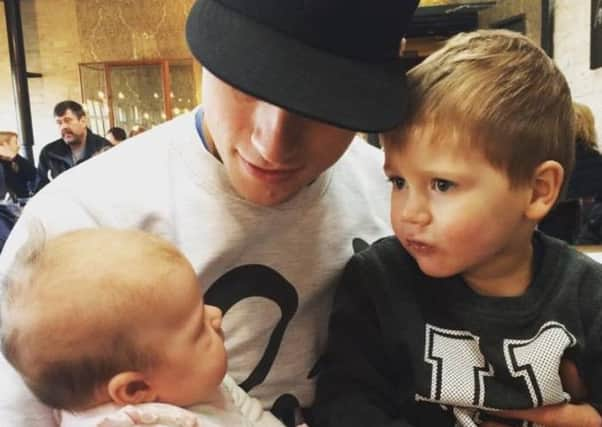Majority of Scottish dads say their mental health has suffered since having children


According to new research by Fathers Network Scotland a quarter of fathers said they feel like they can’t cope and believe that they are not good parents. The charity says results published for Fathers’ Day are “shocking” and highlight the need to support fathers.
Of the fathers surveyed those who said their mental health had suffered, around half sought help – but more than 80 per cent of those who looked for professional help found it difficult or not possible to get it.
Advertisement
Hide AdAdvertisement
Hide AdIn light of the findings Fathers Network Scotland says frontline NHS workers across Scotland need to be trained now to help dads access help they need sooner.
In a new report published today the charity is calling for the government to fund the roll-out of their How Are You Dad? initiative, which trains practitioners and maternity staff to check-in with fathers about their mental health and recognise the signs of paternal post-natal depression.
Director of Fathers Network Scotland, Dave Devenney, said: “Our project and the survey shows a clear need to recognise how big an issue mental health is for fathers.
“After six months delivering How Are You Dad? we know that the simple act of asking, how are you dad? can make a big difference. Sometimes that invitation to talk is enough to help fathers to open up. That’s not easy in a culture that still has an expectation for us to man up and get on with things.
“Now we need to make this standard practice. To take the next step towards reaching fathers that need support.”
The first evaluation report of the project concludes that the Scottish Government funded project has been effective in improving understanding and practices.
Sixty per cent of frontline staff that took part in the project reported that they saw a positive difference in dads after just four weeks.
Over 90 per cent said it helped them make changes to better support mental health of fathers. Some have set up new groups for fathers to learn about parenting.
Advertisement
Hide AdAdvertisement
Hide AdAlthough it is generally women who are the main focus for cases of postnatal depression (PND), emerging research has revealed that the mental health of new mothers and fathers is closely linked.
Devenney said the ambitious plans for the project to become standard across the NHS would help shift the culture from “mother focused” to “family centred” to include dads from pre- to post-childbirth and into parenthood.
“We have seen time and again what a positive difference it can make to show fathers they matter, as much as mums.
“There is a need to move away from the sense of stigma surrounding recognition of mental health issues in fathers. Early intervention must be ‘family focused’. Projects like How Are You Dad? will help normalise anxiety, stress and potentially deteriorating mental health.”
The pioneering initiative was launched in January and has been delivered to over 80 midwives, health visitors and other health professionals across five health boards in Greater Glasgow; North Lanarkshire; Fife; Tayside; and East Lothian.
Now FNS wants to see champions in every health board and for training be added to the action plan of the Managed Clinical Network for Perinatal Mental Health, both nationally and regionally.
Lead clinician for the Perinatal Mental Health Network, Roch Cantwell said, “We know that some fathers may struggle with their mental health and all fathers need, at the very least, is someone to talk to about the changes they’re going through.
“Supporting fathers is win, win, win – it’s good for the mother, it’s good for the infant, and it’s good for the dad himself.”
CASE STUDY: ‘I buried my head in the sand and muddled on’
Advertisement
Hide AdAdvertisement
Hide AdRoss Duns had suffered depression on and off and always managed to bring himself out of it. But after his son Harvey, 5, was born he struggled to cope. “I buried my head in the sand and muddled on for another few years.”
When his daughter Sophia, 2, was born things got much worse.
“I knew it wasn’t right that I didn’t feel anything for my daughter.
“If something happened, it was like I wouldn’t have been bothered. And that didn’t even make me sad.
“It was like being in a black hole. I was snapping at my family all the time. That made it worse, I felt embarrassed, ashamed and sad. It became a vicious cycle.”
Ross, from North Berwick, started having suicidal thoughts. “I felt like I was a burden and that my wife was left to always be picking up the pieces. I thought my family would be better off without me.”
After his family encouraged him to get help Ross went to his GP and was supported through medication.
“Things have drastically improved. It’s like I was a different person. I can cope taking the kids out on my own now and that takes the pressure of my wife. My relationship with the kids has improved. It’s not easy. I need to make the conscious effort now to look after myself and know when things go wrong.”
Advertisement
Hide AdAdvertisement
Hide AdThe 32-year-old engineer is using his experience with post-natal depression to help others. After completing the How Are You Dad? training he runs sessions at work as a mental health champion.
“There is still a stigma but I see things changing. When I ask another dad if they are doing okay and they say they are fine, I know that the door has been opened. If it came to it they know they can come and talk to me. That can really make all the difference.”